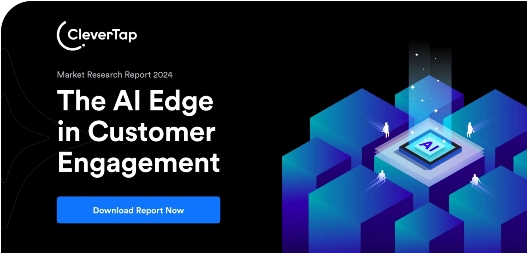CleverTap, the all-in-one engagement platform, today released its market research report on “The AI Edge in Customer Engagement”. The report sheds light on how AI is the next frontier in the customer engagement domain and how brands can implement AI for the right use cases and gain maturity in AI adoption to drive a boost in conversion and growth in business value.
RELATED: CleverTap launches Clever.AI for customer engagement and retention
The research conducted by CleverTap highlights insights from analyzing 42 global brands, running campaigns for millions of customers across more than 50 countries. The research participants included a broad spectrum of professionals, from technical specialists in AI to marketing strategists, including profiles like VPs, CMOs, Data Science leads, Product Managers, and Marketers.
The research study serves as a guide for brands navigating the implementation of AI. Brands at the initial stages of AI adoption should aim to progress towards more advanced levels. This will involve brands needing to shift from using AI for operational efficiency to leveraging it for personalization, experimentation, and ultimately, strategic planning and decision-making.
CleverTap has found that in the customer engagement domain:
- 54%respondents achieved faster content generation and campaign rollout with AI
- 82%of respondents have experienced increased operational efficiency with AI by streamlining workflows and automating content generation
- 64%of respondents have used AI to build personalized experiences and content resonating with individual preferences at scale with real-time experimentation for optimal engagement
- 39%of respondents leveraged AI for automated decision-making and taking more informed decisions by analyzing large volumes of data, predicting outcomes and strategizing for the next best action
In terms of adoption of AI by teams within a brand:
- 4%of respondents highlight that AI capabilities are most extensively utilized by content teams, underscoring the pivotal role AI plays in content generation
- Followed by growth marketing teams at 1%indicating a robust application of AI in strategizing and expanding marketing efforts. Central marketing and product teams also integrate AI into their operations, although to a lesser extent
CleverTap found that brands today miss out on 4x higher conversions and improved business value due to inefficient AI adoption. CleverTap also assessed the impact of adoption of Clever.AI, CleverTap’s AI engine in brands by classifying these into three levels based on their AI-driven use cases in customer engagement.
The research study categorizes brands based on the value they have realized through three distinct levels of AI adoption. These classifications are determined by their use of Clever.AI’s capabilities in driving operational efficiency, enhancing personalization and experimentation at scale, and automating decision-making.
- In Level 1, 89%respondents observed operational efficiency as the primary benefit when utilizing Clever.AI’s capabilities
- In Level 2, 90%of respondents observed scalability of personalization and experimentation as their top gain from Clever.AI’s capabilities
- In Level 3, around 67%of participants in this category selected AI-automated decision making as their foremost benefit from integrating Clever.AI
The report further looked at the impact of AI on conversion rates and on business value. For more information, download the report here.
Commenting on the report, Jacob Joseph, VP – Data Science, CleverTap, said, “AI is the catalyst reshaping every facet of today’s brands – from optimizing operations and enriching customer engagement to revolutionizing decision-making. The insights highlighted in our 2024 market research report offers a great strategic approach for brands at the initial stages of AI adoption should aim to progress gaining maturity and achieve significant improvements in conversion rates and business value. After all, AI in customer engagement or in a tech stack is no longer just an enhancement, but a necessity for a competitive advantage while addressing evolving customer expectations.”































